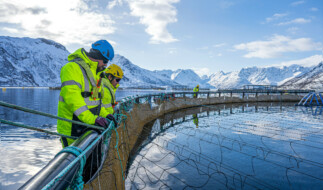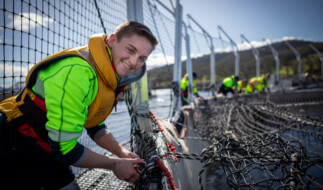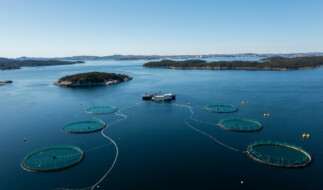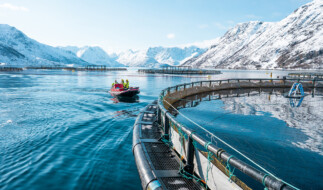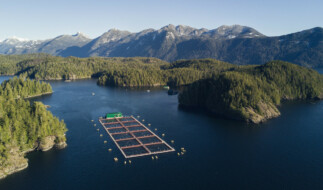Global Salmon Initiative (GSI) launched with commitment to sustainable salmon farming
Group representing 70% of the global farmed salmon industry announces commitment to sustainability leadership initiative as a path towards significant change.TRONDHEIM, Norway – August 15, 2013, 00:01 CEST: CEOs of the global farmed salmon industry today launched a major industry-led sustainability initiative. The Global Salmon Initiative (GSI) unites 15 global farmed salmon producers committed to greater industry cooperation and transparency, in order to achieve significant and continuous progress in industry sustainability. The initiative aims to make significant strides in providing a sustainable source of protein (farmed salmon) to feed a growing population.
With a shared ambition of improving industry performance across three pillars of sustainability: reducing environmental impact, increasing social contribution and maintaining economic growth. GSI today announced that they are focusing on areas where they can make ambitious, yet achievable, improvements, within a realistic timeframe.
“As an industry, we recognize that while we have made significant progress, there is still a lot to be done in terms of sustainability. As a relatively young industry, we hope that through industry collaboration, research and sharing of knowledge, we can make the necessary changes to do better, and keep getting better,” said GSI co-chair Alf-Helge Aarskog, CEO of Marine Harvest.
Keen to make substantial improvements, GSI is concentrating their efforts on three priority areas facing the industry: biosecurity, feed sourcing and meeting industry standards.
José Ramón Gutíerrez, co-chair of GSI and Executive Director of Multiexport Foods SA, commented: “Each of our focus areas are critical and integral to the success of our industry, and with commitment across regions to work together for the first time, we have the opportunity for real and beneficial change.”
The members of GSI are committed to significant improvements in the sustainability of their operations. The Aquaculture Stewardship Council (ASC) standard for salmon aquaculture provides a framework to guide and report on the progress GSI is making, and the initiative is adopting the ASC framework as its primary reference point for work and progress. It is recognized that while salmon farmers have already been making progress toward greater sustainability, and have met the requirements of other demanding standards, they acknowledge that more needs to be done.
"This is a game-changer. The salmon sector working together and embracing sustainability is going to radically change aquaculture – and affect the food industry in a big way,” said Dr Jason Clay, Senior Vice President of Market Transformation for World Wildlife Fund (WWF).
WWF launched the Salmon Aquaculture Dialogues nine years ago, the outcome of which was the ASC standard. “This commitment shows that these companies see sustainability as a pre-competitive issue, one that they can work on together to make progress more quickly,” Clay added.
GSI is committed to working closely with industry partners to ensure it is making significant change in areas affecting the whole of the industry, and is not merely satisfying the status quo. Keen on improving sustainability across the aquaculture industry, GSI has also formed an alliance with the Food and Agriculture Organization (FAO) of the United Nations. Both parties share a goal of supporting the expansion of sustainable aquaculture as a source of high quality food source for a growing global population.
“Through the GSI and FAO partnership, there is the potential to improve access and the exchange of information and expertise to support global improvements in environmental and social performance across the industry,” said Árni Mathiesen, Assistant Director General, FAO Fisheries and Aquaculture. “GSI provides an opportunity to seriously address sustainability challenges as a commodity subsector and this could provide lessons on how a sustainable industry can be created and maintained, and we hope that we can transfer this experience to developing nations, in support of the expansion of their sustainable aquaculture industry, to provide greater sources of nutritious and healthy food.”
As the first initiative of its kind, GSI hopes to maximize their cooperation and resources to ignite improvements which would otherwise be unachievable if attempted individually.
--
ABOUT THE GSI
The Global Salmon Initiative (GSI) is a leadership initiative established by global farmed salmon producers focused on making significant progress on industry sustainability. GSI is committed to fully realizing a shared goal of providing a highly sustainable source of healthy food to feed a growing global population, whilst minimizing our environmental footprint, and continuing to improve our social contribution.
GSI member companies include Acuinova Chile; Bakkafrost; Blumar; Cermaq; Compañía Pesquera Camanchaca; Empresas AquaChile; Grieg Seafood; Lerøy Seafood Group; Los Fiordos; Marine Harvest; Norway Royal Salmon; SalMar; Multiexport Foods SA; The Scottish Salmon Company; Scottish Sea Farms. GSI companies have presence in Chile, Canada, Norway, the Faroe Islands and Scotland, and make significant contributions to the economies of these respective countries.
Further information may be received by contacting the GSI secretariat, AXON, at GSI@axon-com.com or by visiting globalsalmoninitiative.org. Follow us on Twitter @GSI_Salmon.
ABOUT ASC
ASC is the acronym for Aquaculture Stewardship Council, an independent not-for-profit organization. The ASC was founded in 2010 by WWF and IDH (Dutch Sustainable Trade Initiative) to manage the global standards for responsible aquaculture, which are developed by the Aquaculture Dialogues, a program of roundtables initiated and coordinated by WWF. The ASC aims to be the world's leading certification and labeling program for responsibly farmed seafood. The ASC is a global organization working with aquaculture producers, seafood processors, retail and foodservice companies, scientists, conservation groups and the public to promote the best environmental and social choice in seafood. The ASC's aquaculture certification program and seafood label recognizes and rewards responsible aquaculture.
ABOUT FAO
The Food and Agriculture Organization (FAO) of the United Nations is a specialized agency of the United Nations systems, established in 1945 to improve food security, raise levels of nutrition and standards of living for all people in FAO member countries. The organization seeks to secure improvements in the efficiency of production and distribution of food and agricultural products, and to contribute toward an expanding world economy and ensure humanity’s freedom from hunger.
Media contacts:
Tanya Neves
AXON Communications
+44 (0)780 9390664
tneves@axon-com.com
Sophie Ryan
AXON Communications
+44 (0)781 1866516
sryan@axon-com.com
